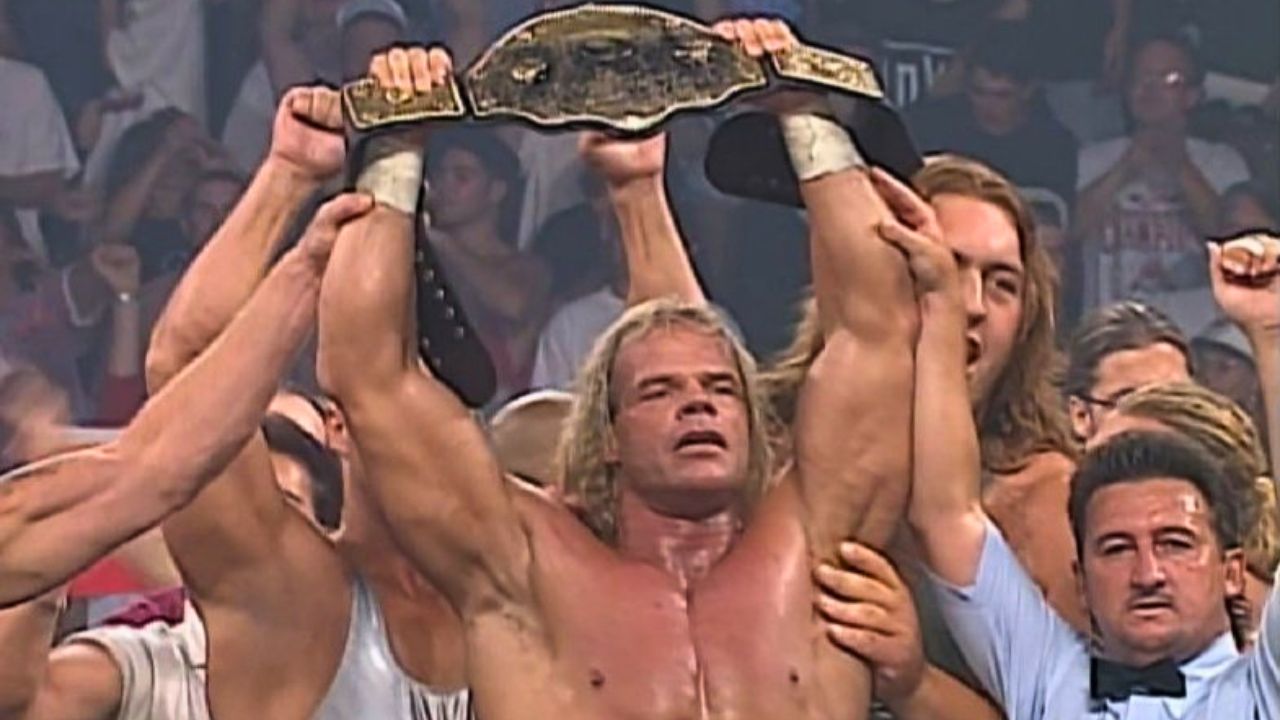Lex Luger’s Golden Age: A Star with a Touch of Patriotism
Within the professional wrestling industry, Lex Luger has long been a fan favorite due to his well-defined physique and dominant presence in the ring. Luger, who gained notoriety for his extravagant demeanor, was essential to the storyline of WWE in the early 1990s, especially during his patriotic run-up to SummerSlam 1993. Beneath the glitz and glamour, Luger recently discussed a major financial setback that coincided with one of his most memorable career milestones.
SummerSlam 1993: The Highest Point in Luger’s Career in WWE
Before SummerSlam 1993, Lex Luger was the top babyface in the WWE, buoyed by the success of his newly established “Made in the USA” image. His iconic body slam of the 500-pound Yokozuna on the USS Intrepid deck on July 4th, which cemented his reputation as an American hero, served as a metaphor for this metamorphosis. The egocentric antagonist of the past was vanished, replaced with an emblem of patriotism, adorned with the American flag.
The WWE Championship match between Luger and Yokozuna at SummerSlam 1993 served as the pinnacle of this patriotic campaign. Luger prevailed via countout despite a fierce and exhausting battle, meaning the title remained in the same hands. There was an obvious joy in the ring, but it was also slightly bittersweet since Luger was not able to win the championship gold.
The Lex Express: An Unpaid Summer of Promotion
The “Lex Express” tour, a cross-country advertising effort aimed at mobilizing support for Luger as he faced the formidable Yokozuna, served as a marker for Luger’s path to SummerSlam. Luger’s tour was one enormous endeavor, with him visiting several cities, interacting with fans, and creating excitement for his championship match. But this promotion whirlwind came at a heavy personal price.
The financial realities of that summer were disclosed by Luger in a recent edition of his podcast, “Lex Expressed”. Even though Luger was the face of WWE’s summer marketing, he revealed that he wasn’t paid for the trip. The structure of WWE at the time meant that a wrestler did not get payment if they were not actively competing in the ring, in contrast to the guaranteed contracts offered by WCW.
“I was unpaid for the entire summer. I received none,” said Luger. “I wasn’t at work. You’re aware of how things were then. Unlike WCW, I did not have a guaranteed deal. My agreement wasn’t assured. No pay, no play.”
A Disappointing Payday: The Financial Repercussions of SummerSlam 1993
The Lex Express tour was not the end of the financial misery. Luger was hoping to take home a six-figure salary from SummerSlam 1993, especially after doing so much promotional work in the months before. But the real deal was much less profitable.
“I wasn’t disappointed, but I thought maybe, with not getting paid all summer, it would have been a little more than that,” Luger said, narrating his experience. If I were to guess, I would say I got maybe $50,000 or something. My target was something like $100,000.”
Luger felt that he should have received much more than the $50,000 settlement, especially in light of the significance of the incident and his part in it. His remarks highlighted the often harsh financial realities that even elite wrestlers of this era had to deal with, wherein compensation did not always match the amount of work and visibility that the organization required.
A Memoir of WWE’s Pay Structure in the 1990s: A Glimpse into the Past Luther’s story serves as a sobering reminder of the distinctions in pay between WWE and WCW in the 1990s. WWE did not provide the same amount of financial stability as WCW, which had guaranteed contracts. One of the numerous elements that eventually led to the notorious Monday Night Wars, where talent frequently defected in pursuit of better pay and working circumstances, was this pay structure difference.
Wrestlers in the WWE only received compensation for participating in contests because the organization had a performance-based pay structure. The “no play, no pay” rule might apply more harshly to people who were injured or, as was the case with Luger, engaged in promotional activities unrelated to wrestling. Although WWE paid for his lodging during the Lex Express tour, it didn’t make up for the absence of money.
The Legacy of Lex Luger: More Than Just a Payday
Even with SummerSlam 1993’s financial setbacks, Lex Luger’s reputation in the wrestling community endures. His contributions to the industry have had a lasting impact on WWE history, especially during his patriotic run. Luger’s accomplishments are still being celebrated by the fans, who think he has a good chance of being inducted into the WWE Hall of Fame in the future.
Luger valued his contribution to the sport over financial gain when he looks back on his career. Even while the wage gap may have been difficult to accept at the time, Luger’s continued appeal and the regard he enjoys in the wrestling world are proof of his everlasting impact.
A Teaching For The Past And Future Of Wrestling
The disclosures made by Lex Luger on his SummerSlam 1993 earnings provide an intriguing window into the commercial aspects of professional wrestling in the 1990s. His story highlights the difficulties wrestlers of that era experienced and serves as a reminder of the progress made by the industry in terms of rights and compensation for talent.
Luger’s biography prompts significant inquiries regarding how the wrestling industry evaluates talent and what can be inferred from the past as fans and analysts consider it. Even though professional wrestling’s financial situation has changed dramatically since Luger’s peak, his tale is still a fascinating part of the sport’s continuing narrative.
New generations of wrestlers and fans are inspired by Luger’s legacy, which is based on more than simply money. It demonstrates that true brilliance in the ring is determined not by paychecks but rather by passion, dedication, and the legacy left behind.




